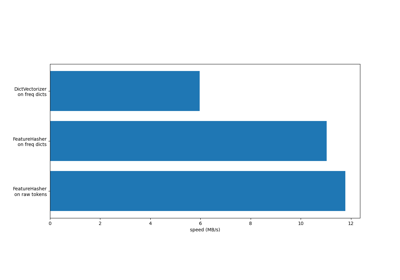DictVectorizer#
- class sklearn.feature_extraction.DictVectorizer(*, dtype=<class 'numpy.float64'>, separator='=', sparse=True, sort=True)[source]#
Transforms lists of feature-value mappings to vectors.
This transformer turns lists of mappings (dict-like objects) of feature names to feature values into Numpy arrays or scipy.sparse matrices for use with scikit-learn estimators.
When feature values are strings, this transformer will do a binary one-hot (aka one-of-K) coding: one boolean-valued feature is constructed for each of the possible string values that the feature can take on. For instance, a feature “f” that can take on the values “ham” and “spam” will become two features in the output, one signifying “f=ham”, the other “f=spam”.
If a feature value is a sequence or set of strings, this transformer will iterate over the values and will count the occurrences of each string value.
However, note that this transformer will only do a binary one-hot encoding when feature values are of type string. If categorical features are represented as numeric values such as int or iterables of strings, the DictVectorizer can be followed by
OneHotEncoderto complete binary one-hot encoding.Features that do not occur in a sample (mapping) will have a zero value in the resulting array/matrix.
For an efficiency comparison of the different feature extractors, see FeatureHasher and DictVectorizer Comparison.
Read more in the User Guide.
- Parameters:
- dtypedtype, default=np.float64
The type of feature values. Passed to Numpy array/scipy.sparse matrix constructors as the dtype argument.
- separatorstr, default=”=”
Separator string used when constructing new features for one-hot coding.
- sparsebool, default=True
Whether transform should produce scipy.sparse matrices.
- sortbool, default=True
Whether
feature_names_andvocabulary_should be sorted when fitting.
- Attributes:
- vocabulary_dict
A dictionary mapping feature names to feature indices.
- feature_names_list
A list of length n_features containing the feature names (e.g., “f=ham” and “f=spam”).
See also
FeatureHasherPerforms vectorization using only a hash function.
sklearn.preprocessing.OrdinalEncoderHandles nominal/categorical features encoded as columns of arbitrary data types.
Examples
>>> from sklearn.feature_extraction import DictVectorizer >>> v = DictVectorizer(sparse=False) >>> D = [{'foo': 1, 'bar': 2}, {'foo': 3, 'baz': 1}] >>> X = v.fit_transform(D) >>> X array([[2., 0., 1.], [0., 1., 3.]]) >>> v.inverse_transform(X) == [{'bar': 2.0, 'foo': 1.0}, ... {'baz': 1.0, 'foo': 3.0}] True >>> v.transform({'foo': 4, 'unseen_feature': 3}) array([[0., 0., 4.]])
- fit(X, y=None)[source]#
Learn a list of feature name -> indices mappings.
- Parameters:
- XMapping or iterable over Mappings
Dict(s) or Mapping(s) from feature names (arbitrary Python objects) to feature values (strings or convertible to dtype).
Changed in version 0.24: Accepts multiple string values for one categorical feature.
- y(ignored)
Ignored parameter.
- Returns:
- selfobject
DictVectorizer class instance.
- fit_transform(X, y=None)[source]#
Learn a list of feature name -> indices mappings and transform X.
Like fit(X) followed by transform(X), but does not require materializing X in memory.
- Parameters:
- XMapping or iterable over Mappings
Dict(s) or Mapping(s) from feature names (arbitrary Python objects) to feature values (strings or convertible to dtype).
Changed in version 0.24: Accepts multiple string values for one categorical feature.
- y(ignored)
Ignored parameter.
- Returns:
- Xa{array, sparse matrix}
Feature vectors; always 2-d.
- get_feature_names_out(input_features=None)[source]#
Get output feature names for transformation.
- Parameters:
- input_featuresarray-like of str or None, default=None
Not used, present here for API consistency by convention.
- Returns:
- feature_names_outndarray of str objects
Transformed feature names.
- get_metadata_routing()[source]#
Get metadata routing of this object.
Please check User Guide on how the routing mechanism works.
- Returns:
- routingMetadataRequest
A
MetadataRequestencapsulating routing information.
- get_params(deep=True)[source]#
Get parameters for this estimator.
- Parameters:
- deepbool, default=True
If True, will return the parameters for this estimator and contained subobjects that are estimators.
- Returns:
- paramsdict
Parameter names mapped to their values.
- inverse_transform(X, dict_type=<class 'dict'>)[source]#
Transform array or sparse matrix X back to feature mappings.
X must have been produced by this DictVectorizer’s transform or fit_transform method; it may only have passed through transformers that preserve the number of features and their order.
In the case of one-hot/one-of-K coding, the constructed feature names and values are returned rather than the original ones.
- Parameters:
- X{array-like, sparse matrix} of shape (n_samples, n_features)
Sample matrix.
- dict_typetype, default=dict
Constructor for feature mappings. Must conform to the collections.Mapping API.
- Returns:
- X_originallist of dict_type objects of shape (n_samples,)
Feature mappings for the samples in X.
- restrict(support, indices=False)[source]#
Restrict the features to those in support using feature selection.
This function modifies the estimator in-place.
- Parameters:
- supportarray-like
Boolean mask or list of indices (as returned by the get_support member of feature selectors).
- indicesbool, default=False
Whether support is a list of indices.
- Returns:
- selfobject
DictVectorizer class instance.
Examples
>>> from sklearn.feature_extraction import DictVectorizer >>> from sklearn.feature_selection import SelectKBest, chi2 >>> v = DictVectorizer() >>> D = [{'foo': 1, 'bar': 2}, {'foo': 3, 'baz': 1}] >>> X = v.fit_transform(D) >>> support = SelectKBest(chi2, k=2).fit(X, [0, 1]) >>> v.get_feature_names_out() array(['bar', 'baz', 'foo'], ...) >>> v.restrict(support.get_support()) DictVectorizer() >>> v.get_feature_names_out() array(['bar', 'foo'], ...)
- set_output(*, transform=None)[source]#
Set output container.
See Introducing the set_output API for an example on how to use the API.
- Parameters:
- transform{“default”, “pandas”, “polars”}, default=None
Configure output of
transformandfit_transform."default": Default output format of a transformer"pandas": DataFrame output"polars": Polars outputNone: Transform configuration is unchanged
Added in version 1.4:
"polars"option was added.
- Returns:
- selfestimator instance
Estimator instance.
- set_params(**params)[source]#
Set the parameters of this estimator.
The method works on simple estimators as well as on nested objects (such as
Pipeline). The latter have parameters of the form<component>__<parameter>so that it’s possible to update each component of a nested object.- Parameters:
- **paramsdict
Estimator parameters.
- Returns:
- selfestimator instance
Estimator instance.
- transform(X)[source]#
Transform feature->value dicts to array or sparse matrix.
Named features not encountered during fit or fit_transform will be silently ignored.
- Parameters:
- XMapping or iterable over Mappings of shape (n_samples,)
Dict(s) or Mapping(s) from feature names (arbitrary Python objects) to feature values (strings or convertible to dtype).
- Returns:
- Xa{array, sparse matrix}
Feature vectors; always 2-d.
Gallery examples#

Column Transformer with Heterogeneous Data Sources
